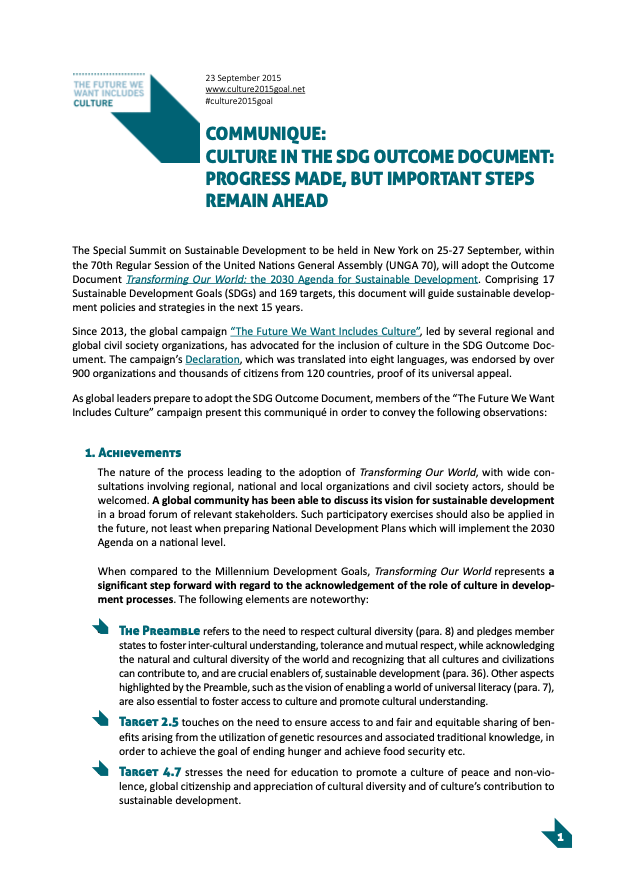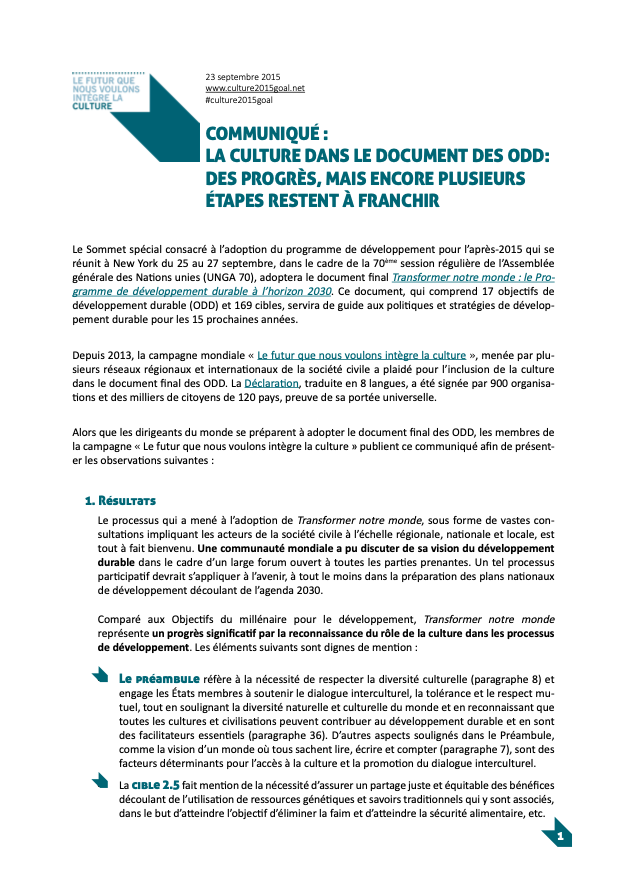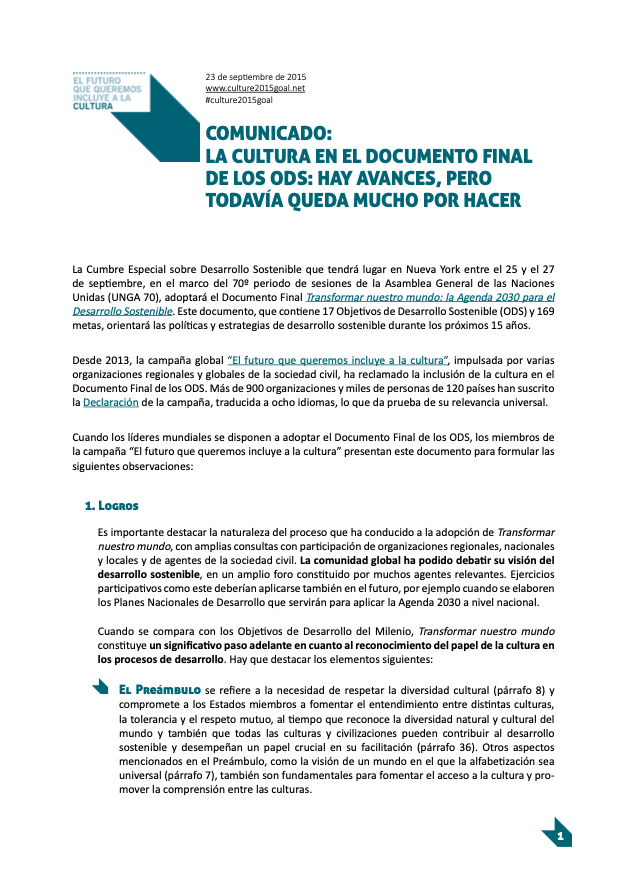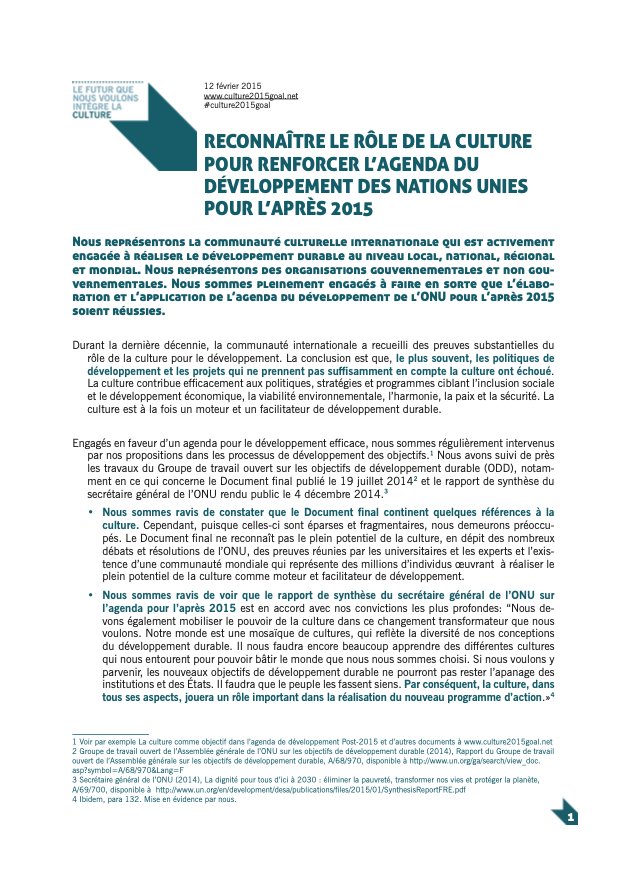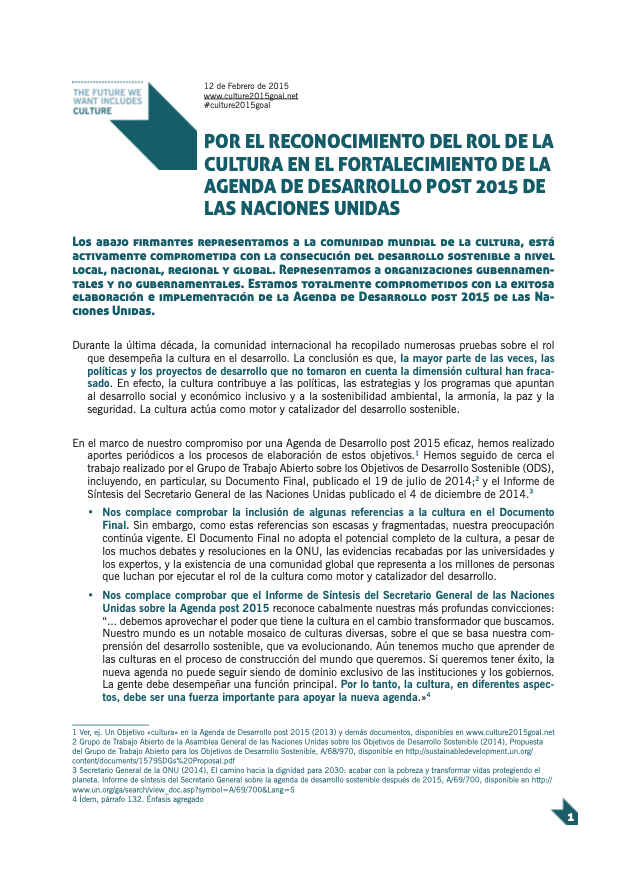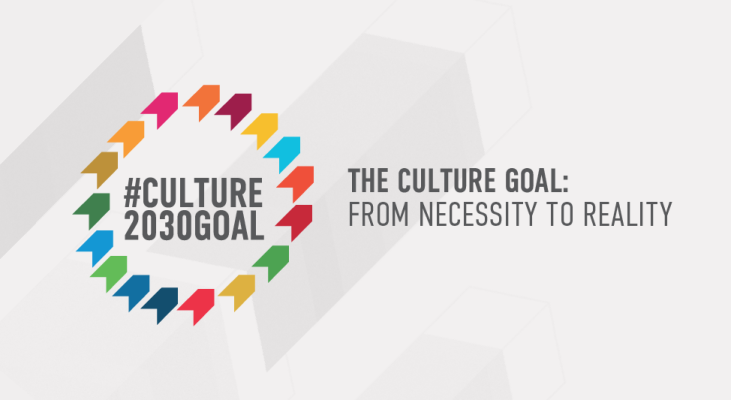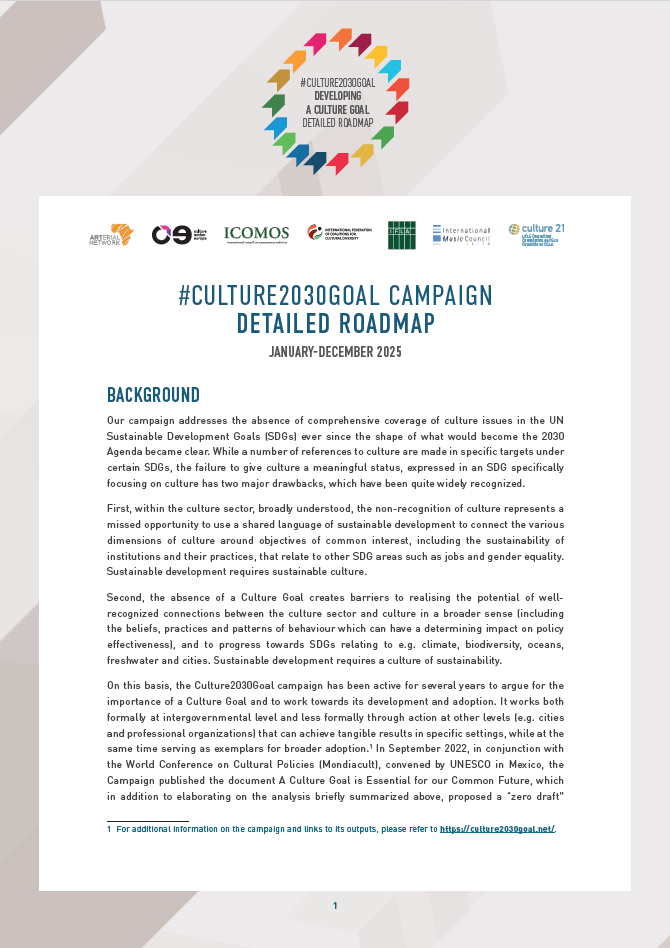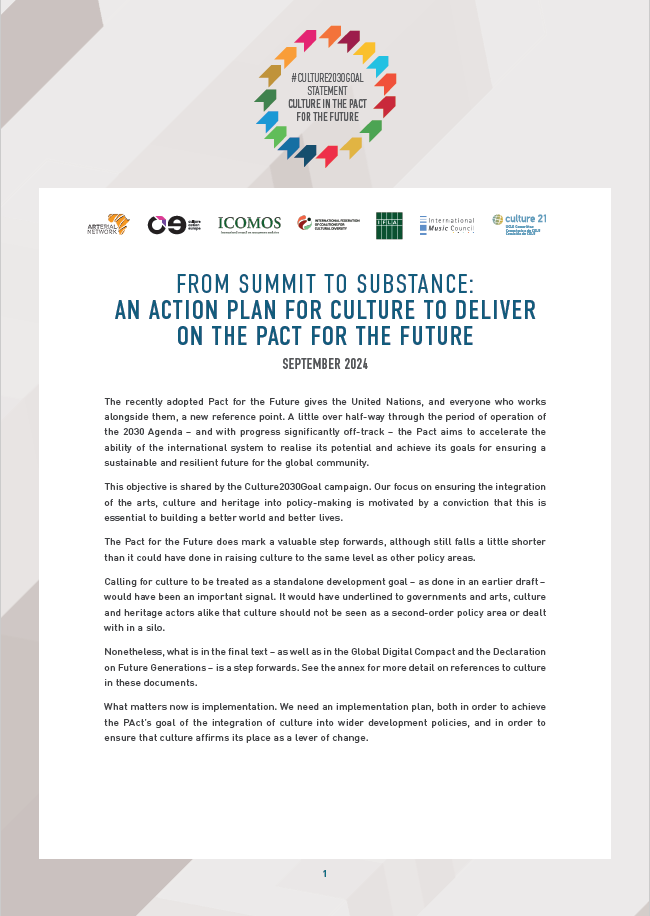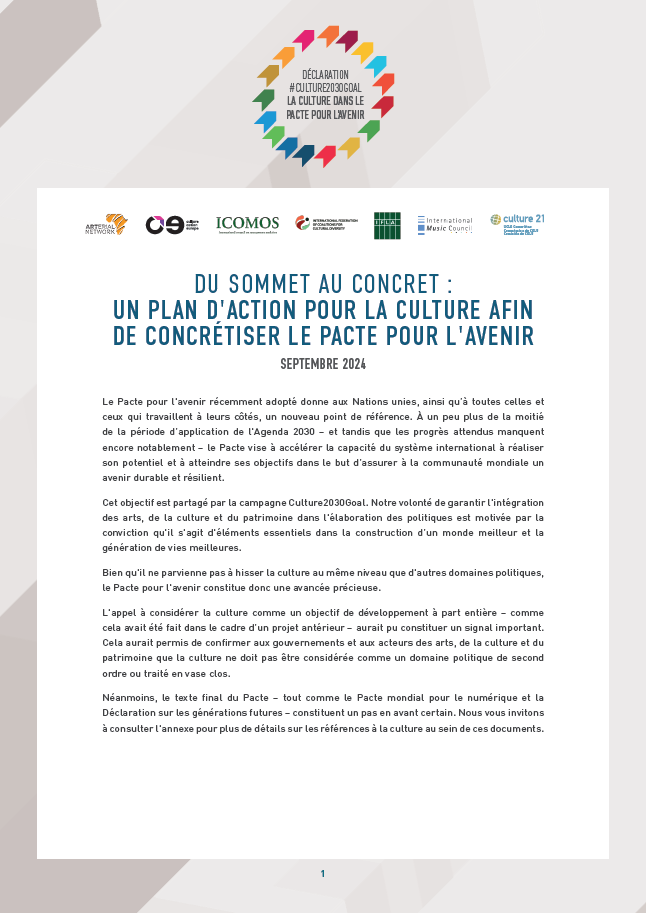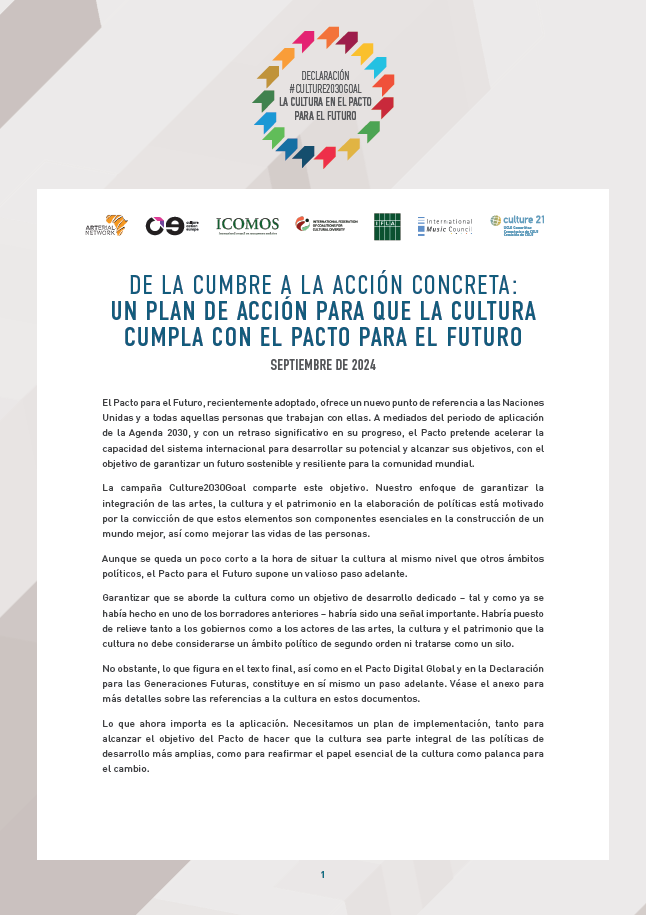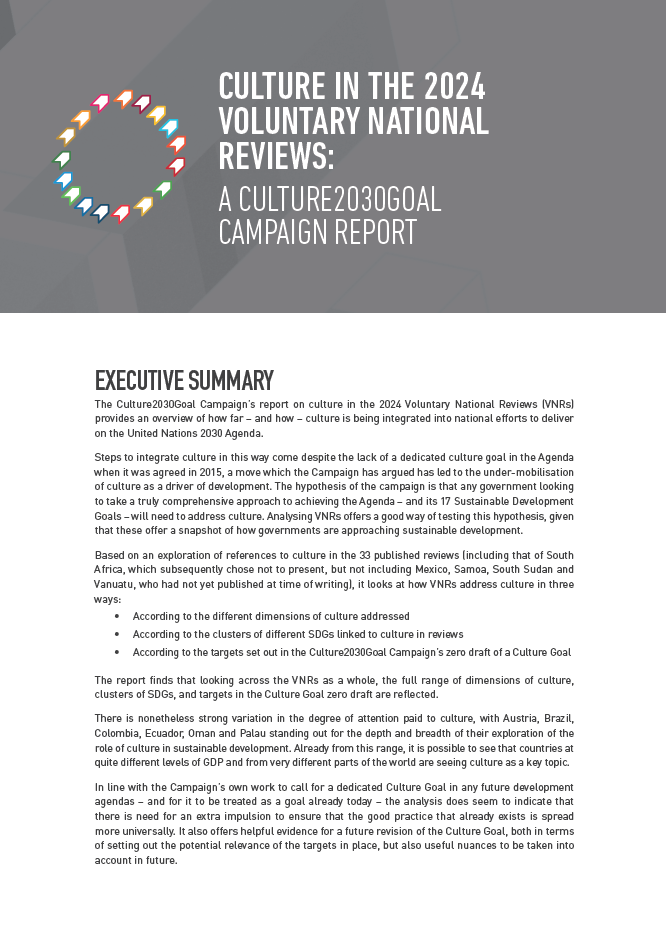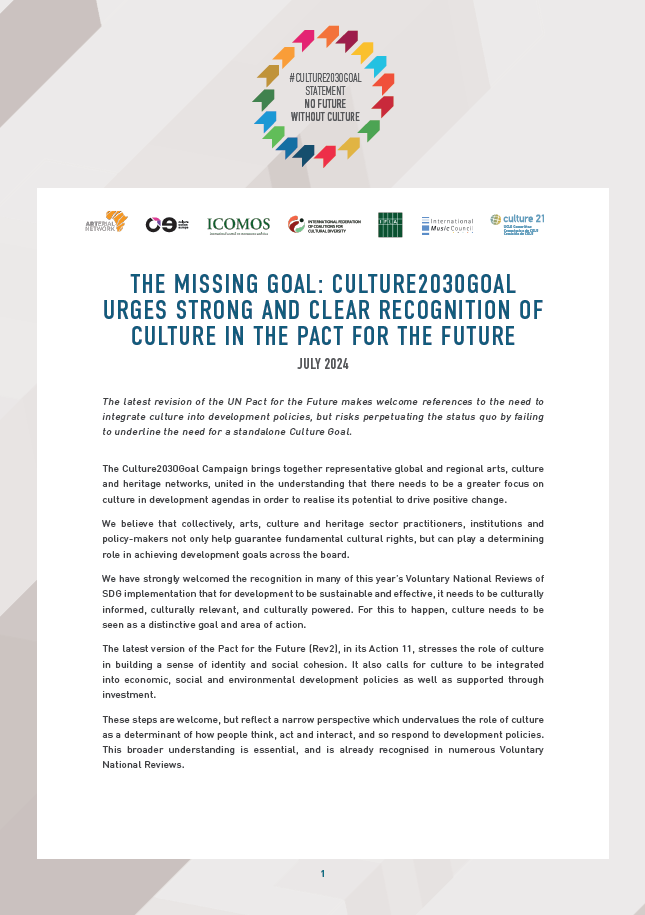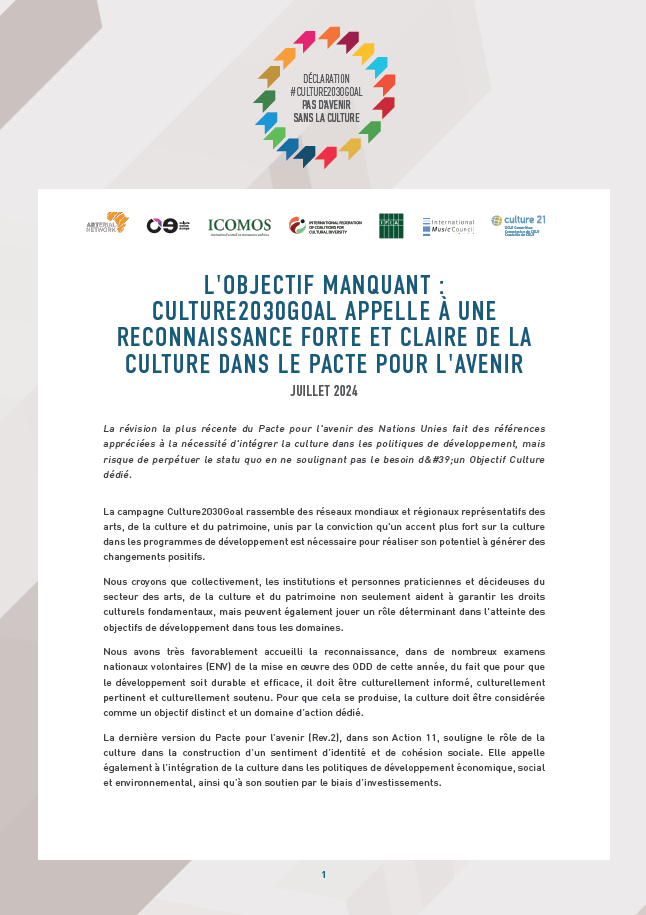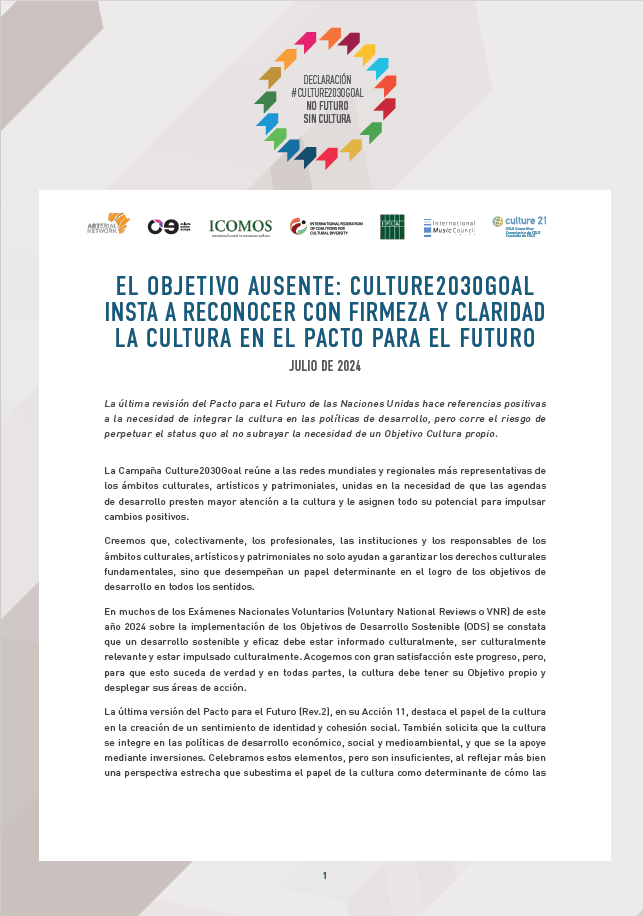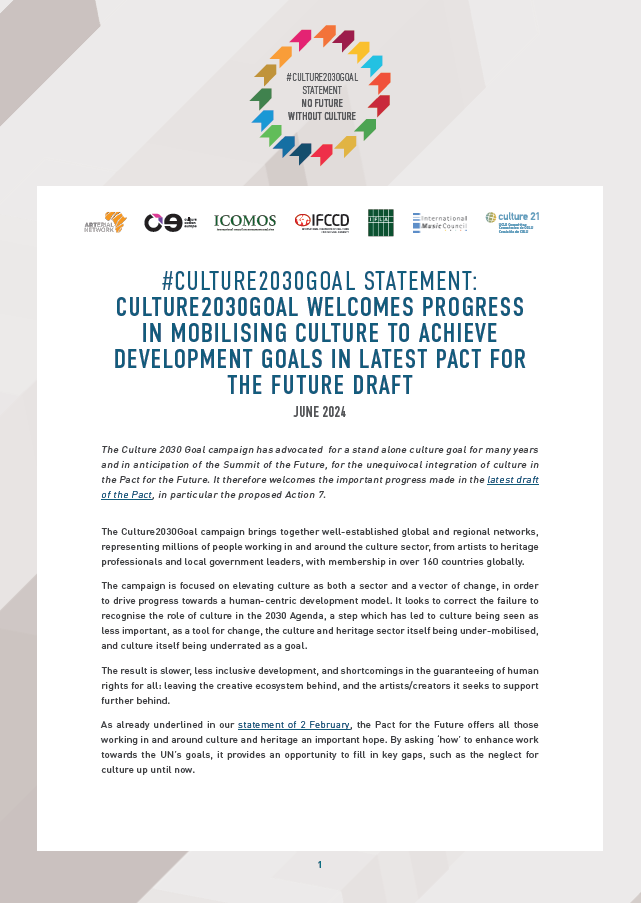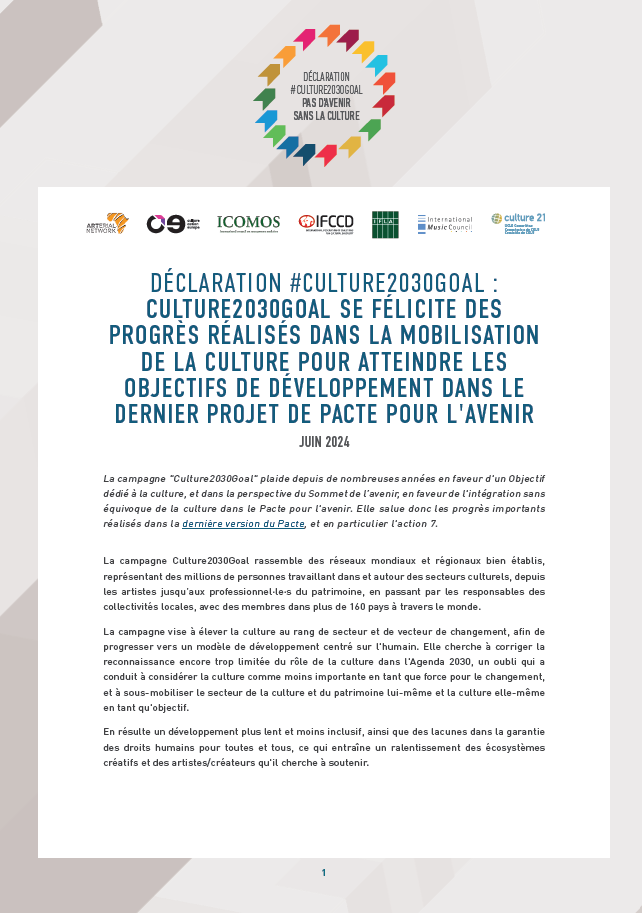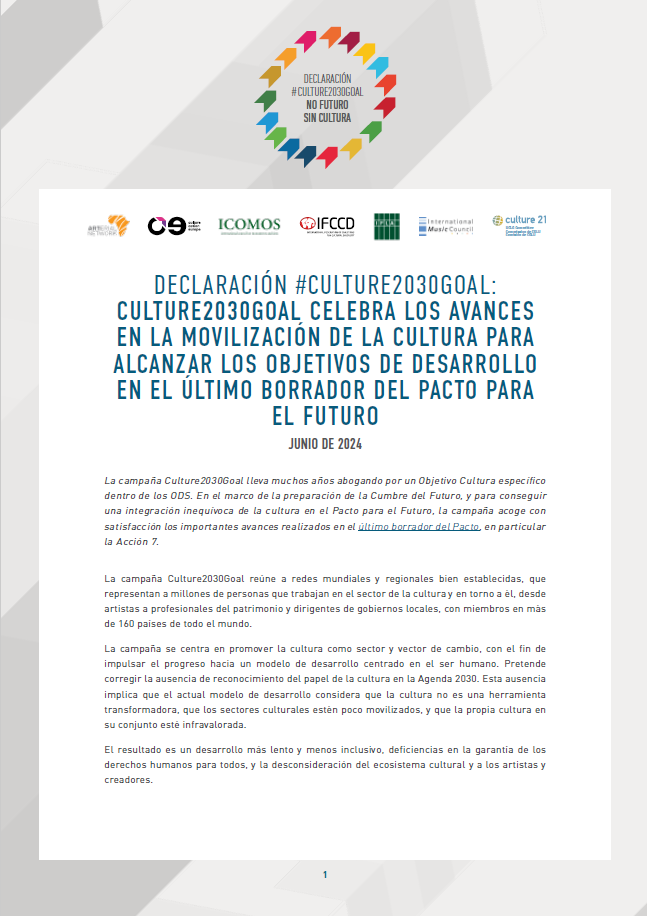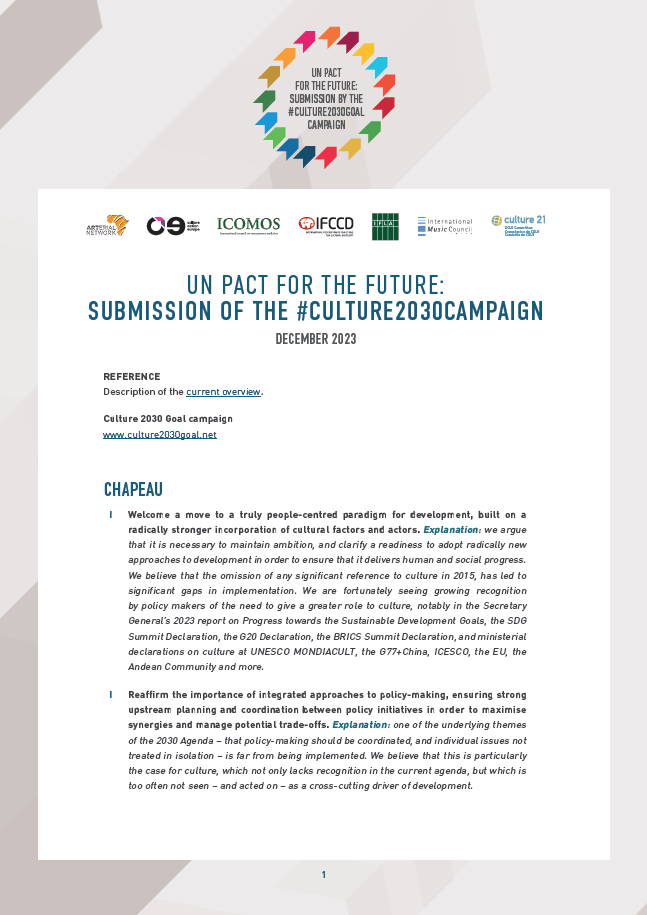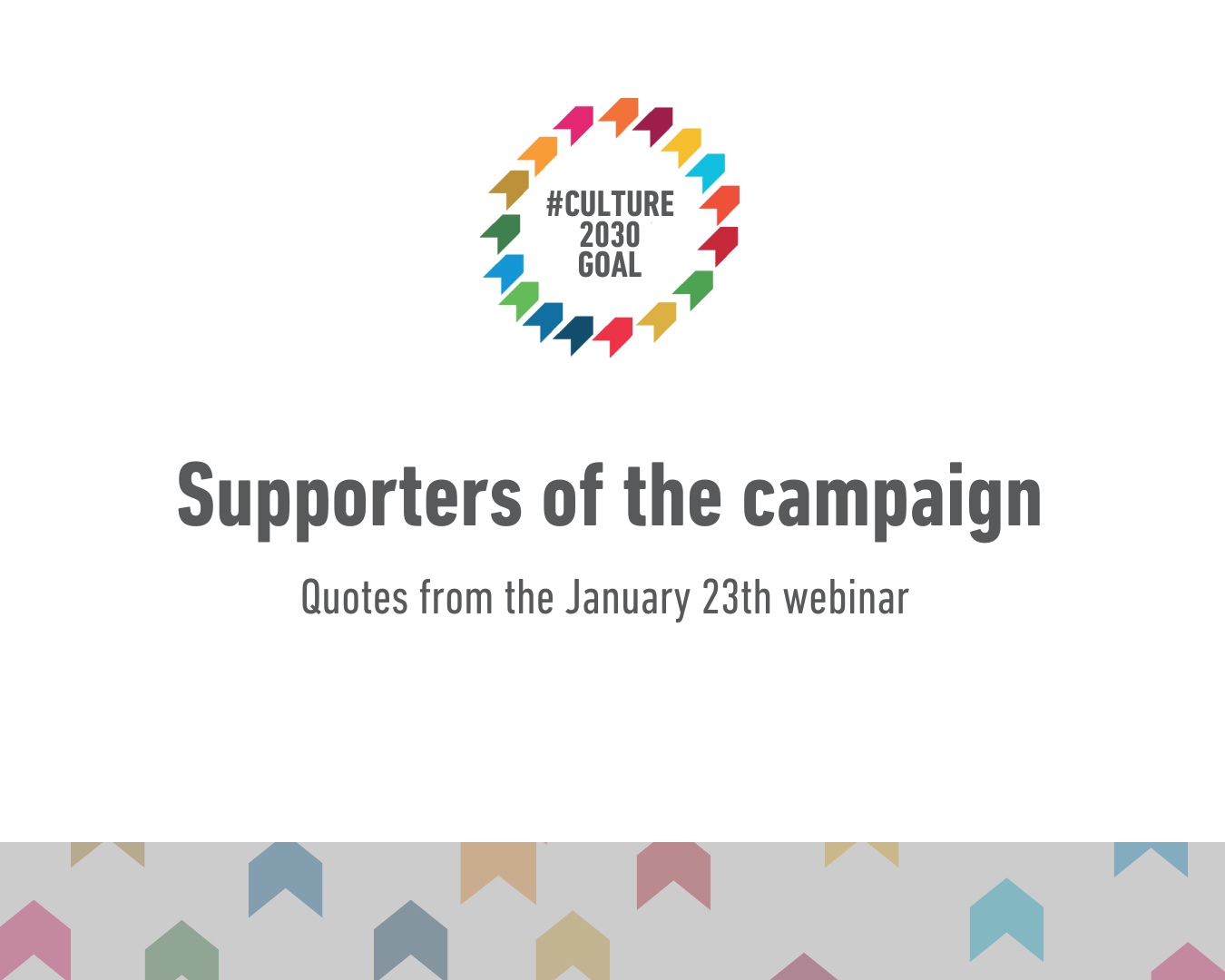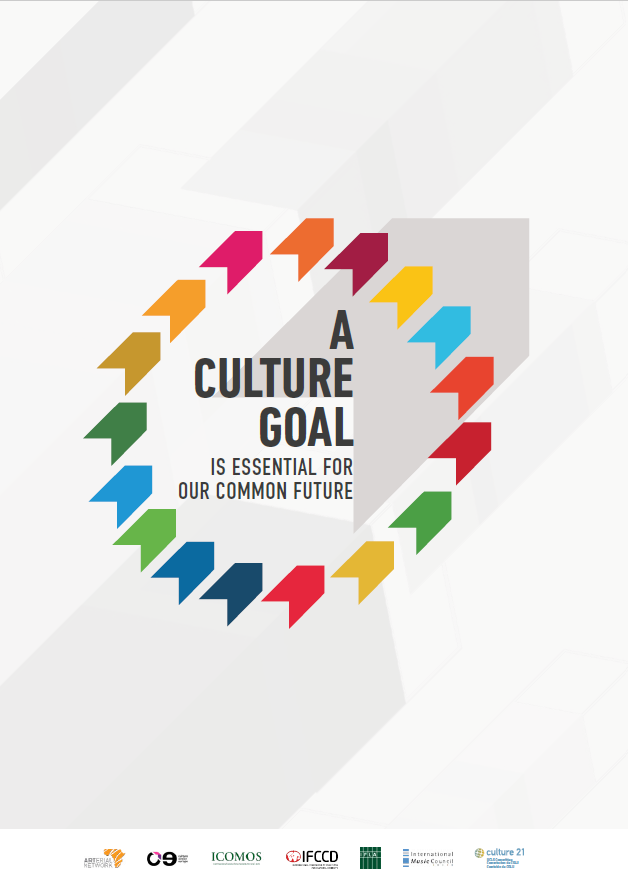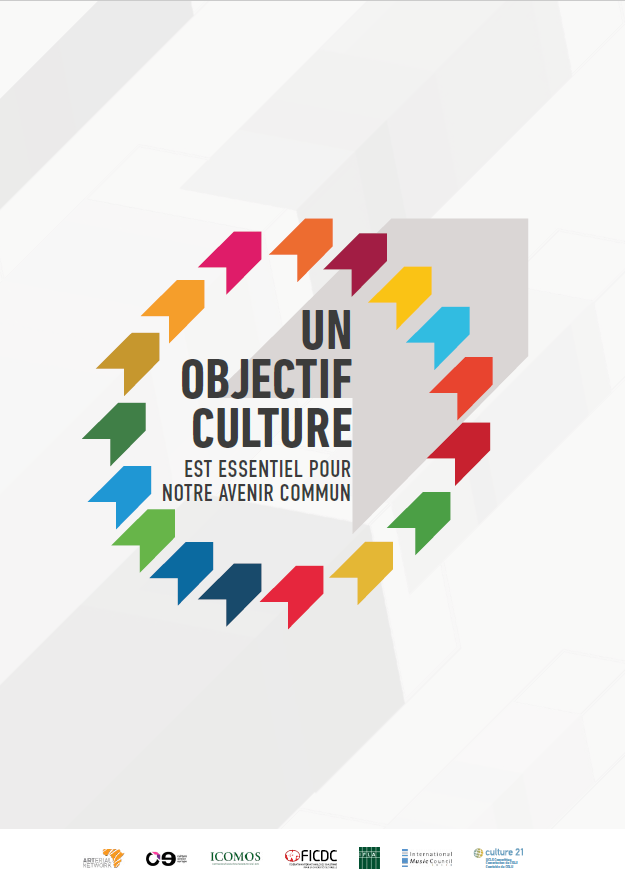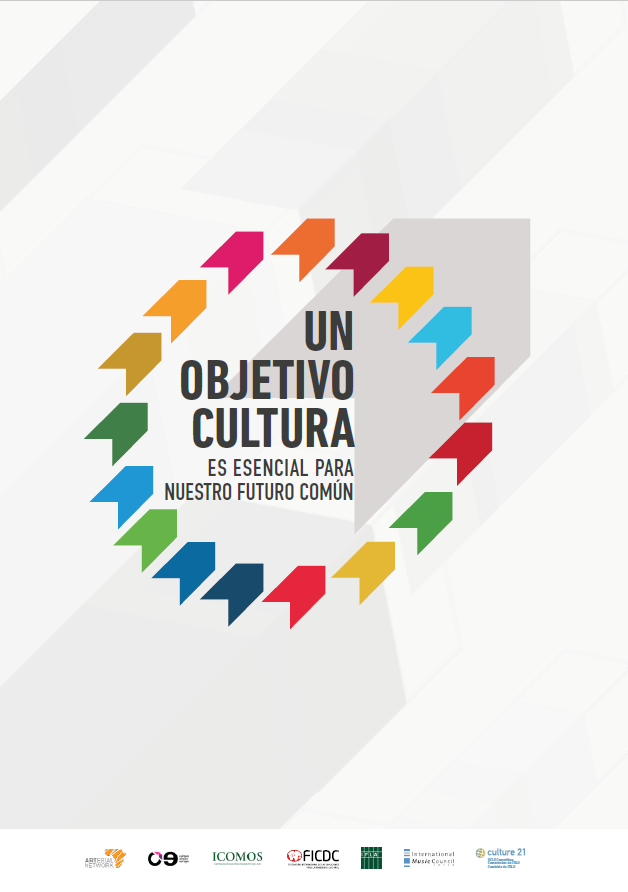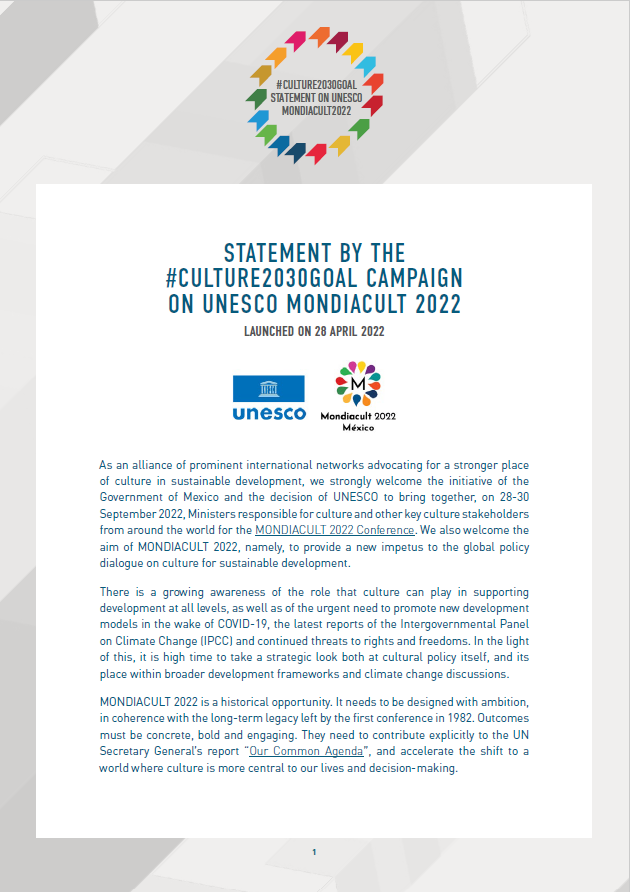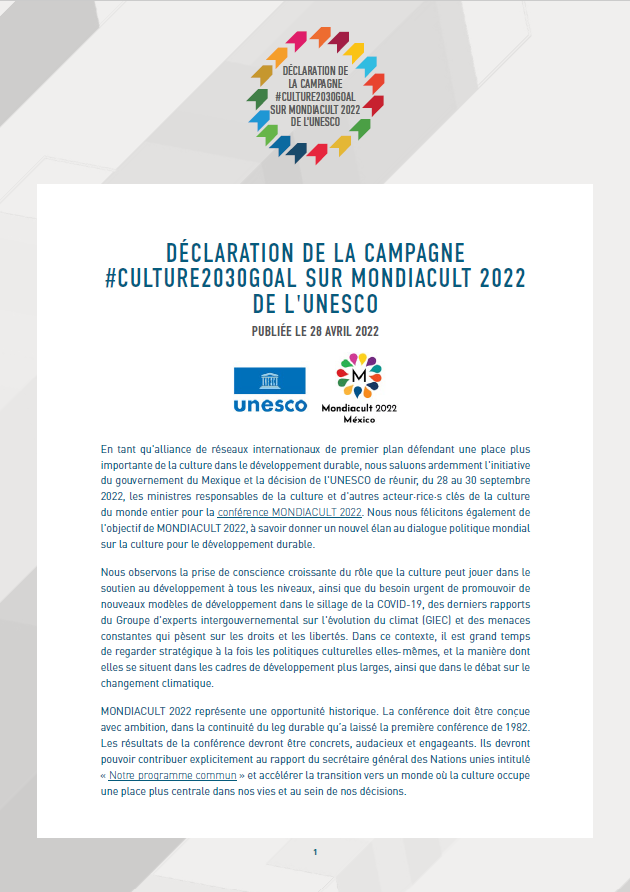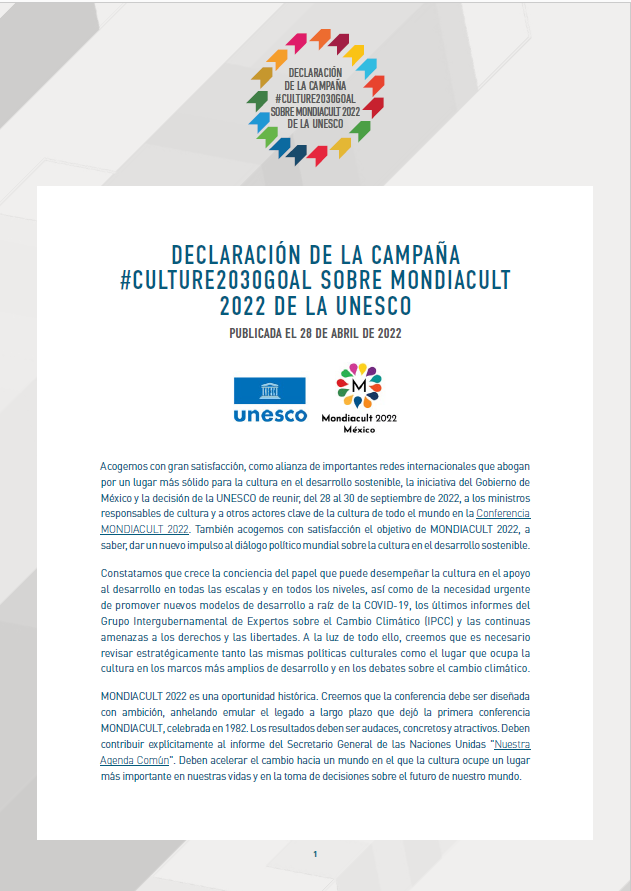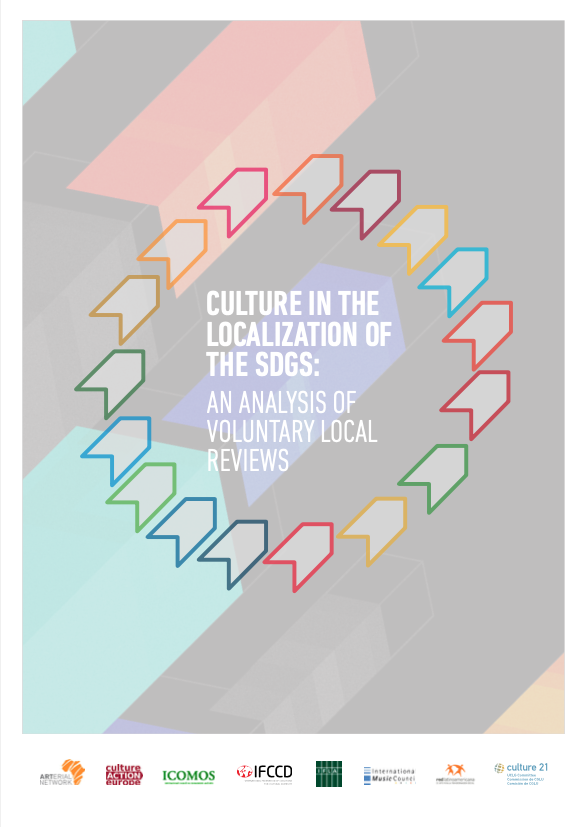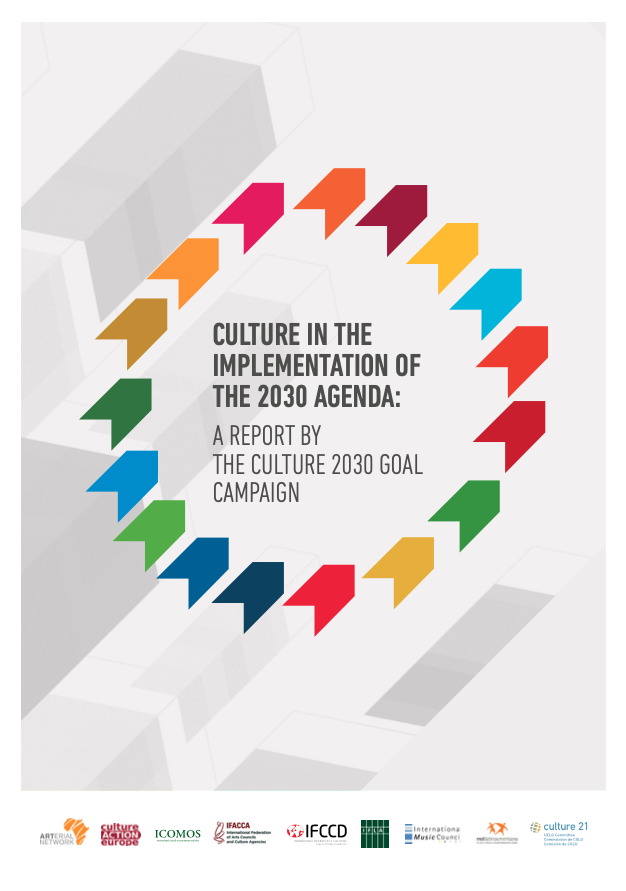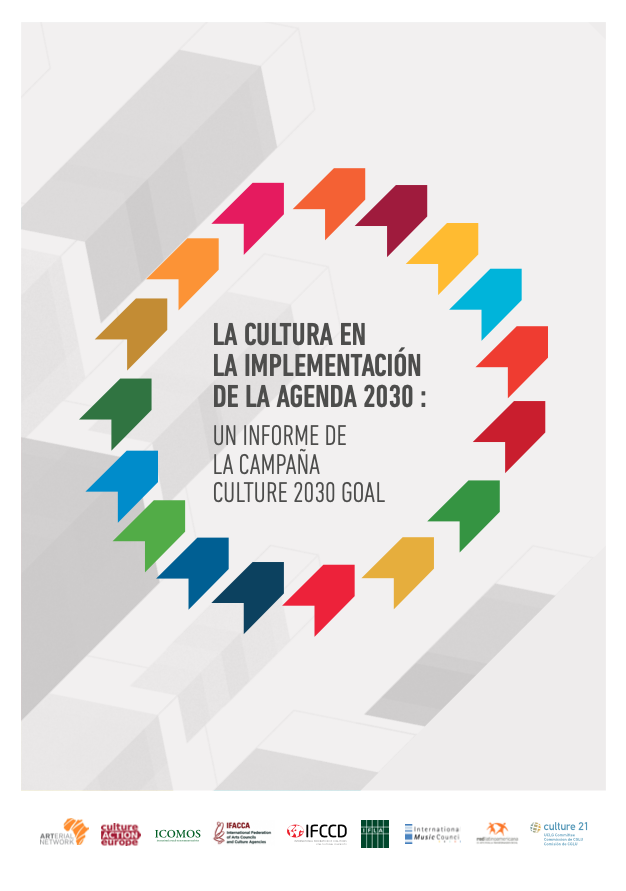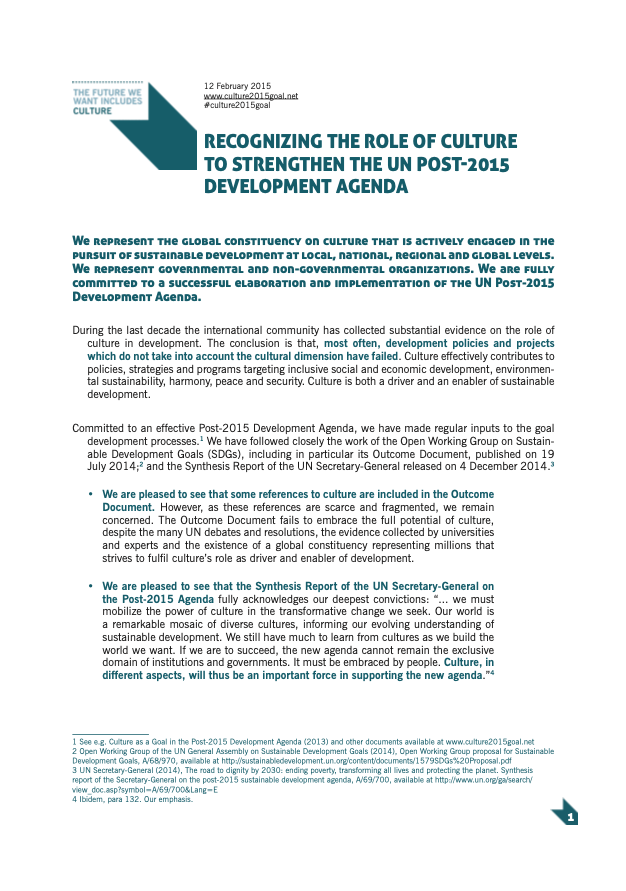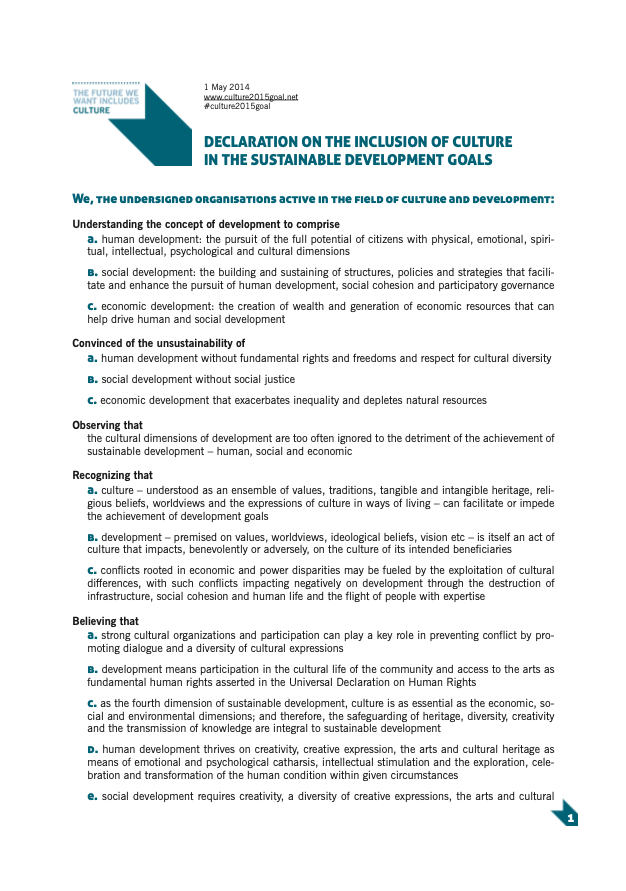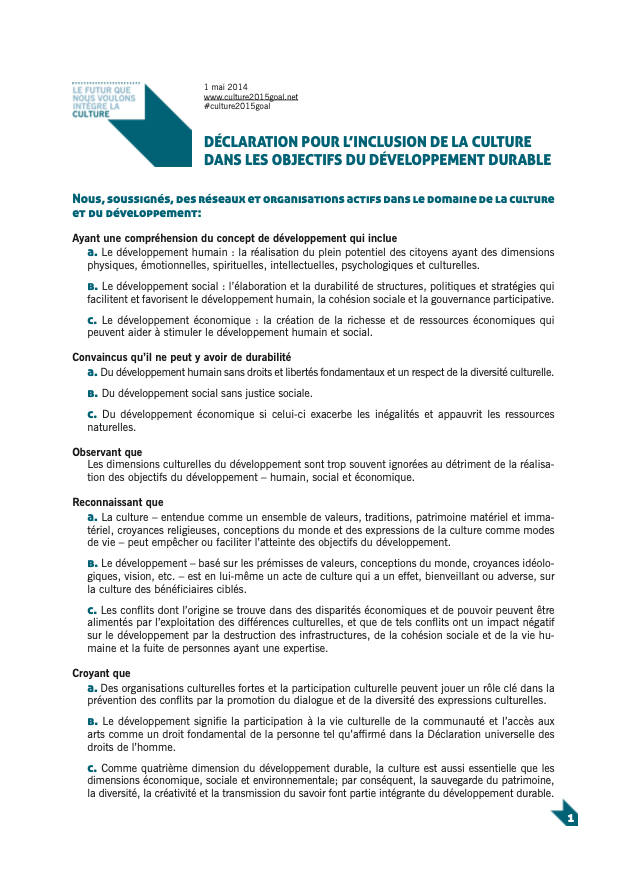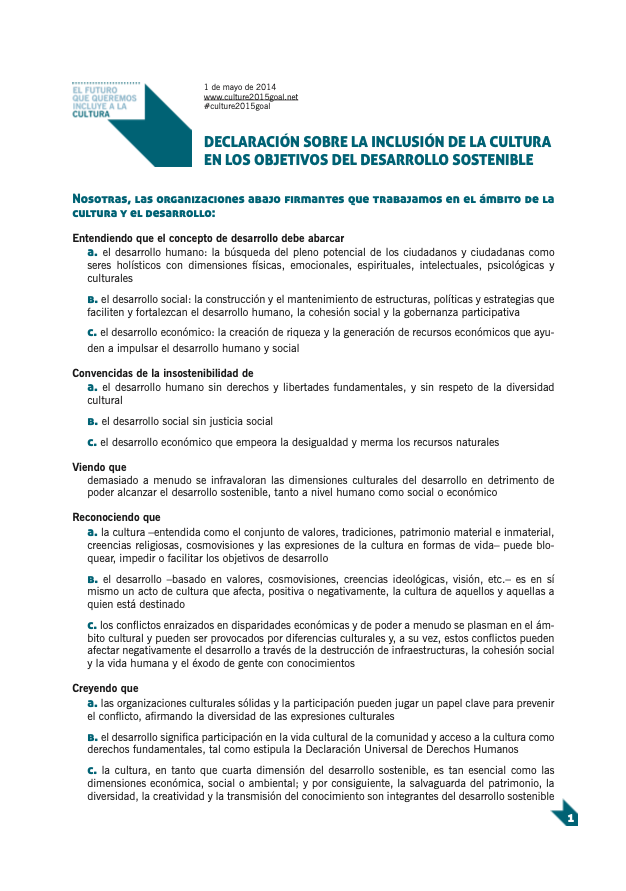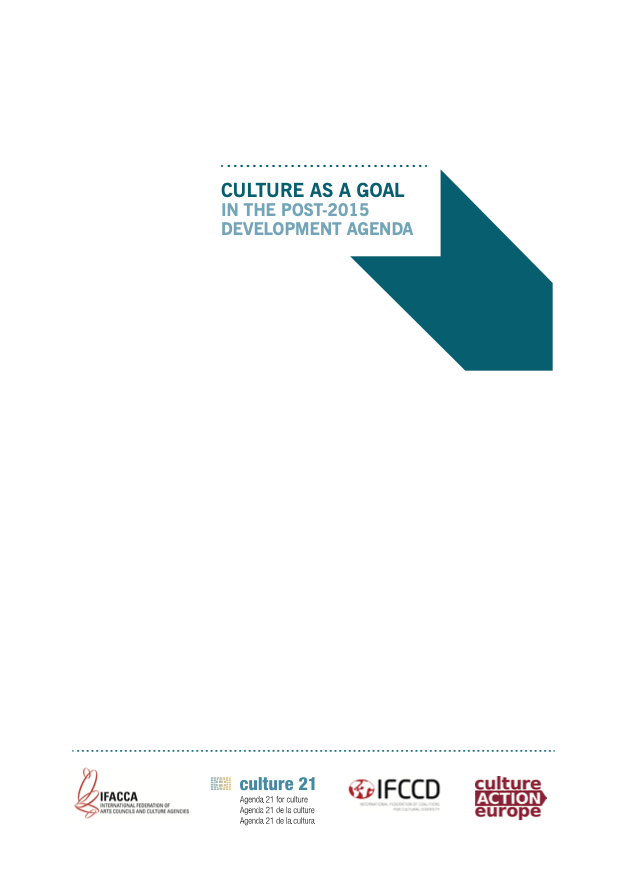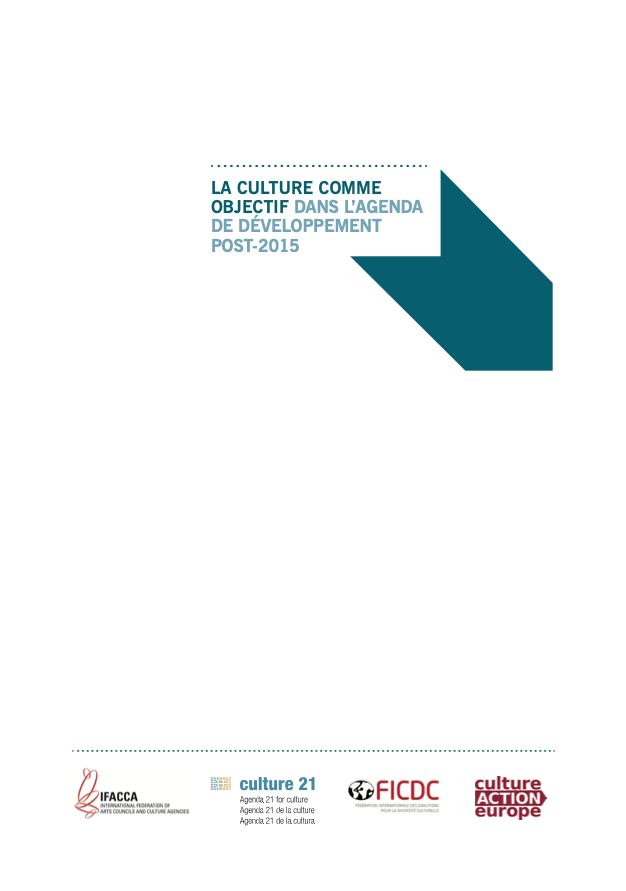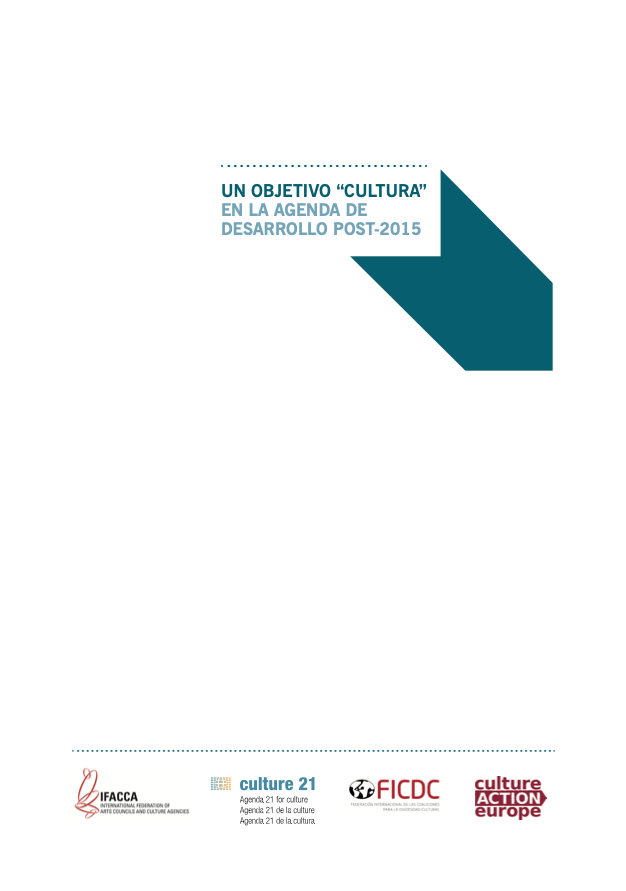In each of the last four years, the Culture2030Goal campaign has carried out an assessment of every single Voluntary National Review (VNR). This short article, written by Stephen Wyber (IFLA), analyses how the treatment of culture in VNR has evolved (positively) over time.
Check out the Statement published by the members of the #Culture2030Goal campaign and their partners ahead of Mondiacult 2025 held in Barcelona from 29 September - 1st October 2025, "Feasible, Desirable, Necessary: Culture2030goal Statement for Mondiacult 2025.

In 2025, the #Culture2030Goal Campaign released a piece on "Culture in the 2025 Voluntary National Reports: a Culture 2030 Goal campaign report" coordinated by IFLA and which highlights some of the different ways in which culture is addressed in these Reviews, celebrates good practices, and indicates areas for further focus.
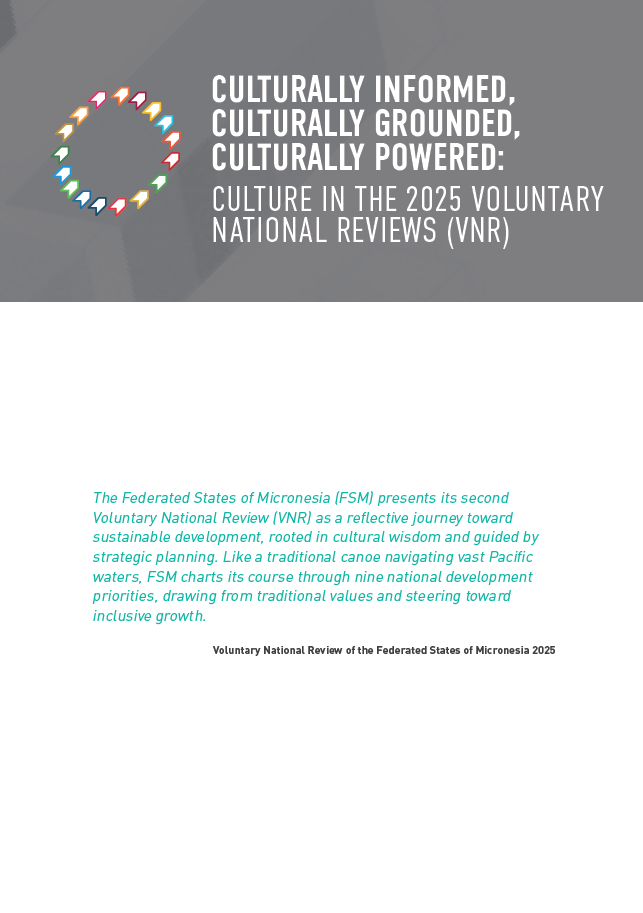
Check out the Roadmap 2025 of the #Culture2030Goal campaign towards developing a Culture Goal for current and future global sustainable development agendas and frameworks.
The recently adopted Pact for the Future gives the United Nations, and everyone who works alongside them, a new reference point. A little over half-way through the period of operation of the 2030 Agenda – and with progress significantly off-track – the Pact aims to accelerate the ability of the international system to realise its potential and achieve its goals for ensuring a sustainable and resilient future for the global community.
This objective is shared by the Culture2030Goal campaign. Our focus on ensuring the integration of the arts, culture and heritage into policy-making is motivated by a conviction that this is essential to building a better world and better lives.
Read the full declaration.
In 2024, the #Culture2030Goal Campaign released a piece on "Culture in the 2024 Voluntary National Reports: a Culture 2030 Goal campaign report" coordinated by IFLA and which highlights some of the different ways in which culture is addressed in these Reviews, celebrates good practices, and indicates areas for further focus.
The latest revision of the UN Pact for the Future makes welcome references to the need to integrate culture into development policies, but risks perpetuating the status quo by failing to underline the need for a standalone Culture Goal.
The Culture 2030 Goal campaign has advocated for a stand alone culture goal for many years and in anticipation of the Summit of the Future, for the unequivocal integration of culture in the Pact for the Future. It therefore welcomes the important progress made in the latest draft of the Pact, in particular the proposed Action 7.
The Culture2030Goal campaign calls out neglect of culture in the Pact for the Future zero draft and invites UN member states to add specific wording. Read the full Statement.
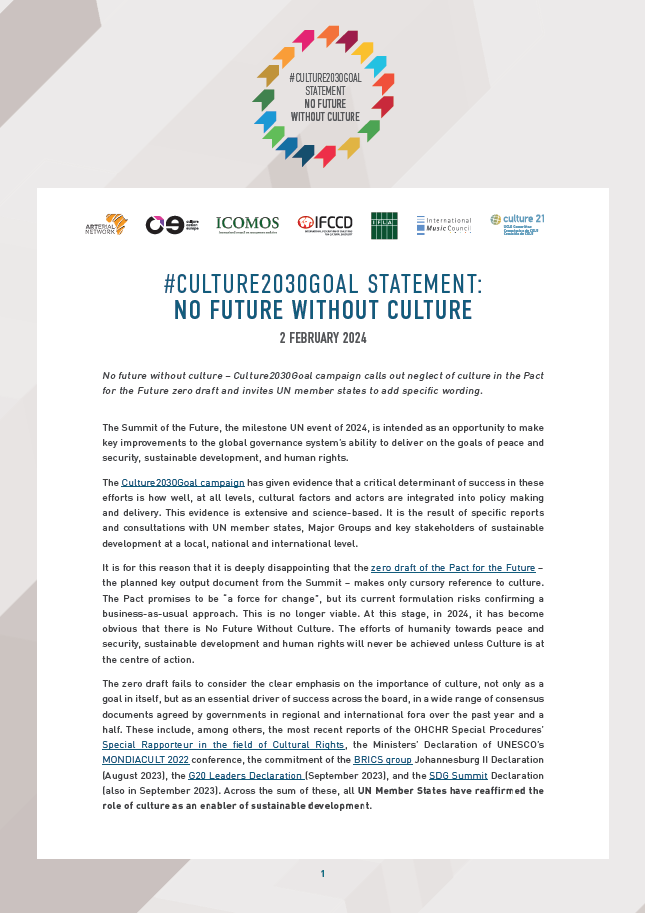
This document is the contribution of the #Culture2030Goal campaign to the draft of the UN Pact for the Future.
Drawing from the Webinar: Looking ahead: Culture in Sustainable Development in 2024 and Beyond organised on 23 January 2024 with the aim of sharing the background and the achievements of the campaign and opening a conversation with key partners and all global cultural networks, the #Culture2030Goal campaign has released a set of communication cards with key messages from our supporters to reinforce communication on social media.
Feel free to use them!
Following the call for an explicit Culture Goal in future development agendas in the MONDIACULT 2022 Declaration convened by UNESCO, the #Culture2030Goal campaign strongly welcomes the recognition of the essential role of culture by the members of the United Nations, G20, the European Union and BRICS in the past months.
Read the Statement.
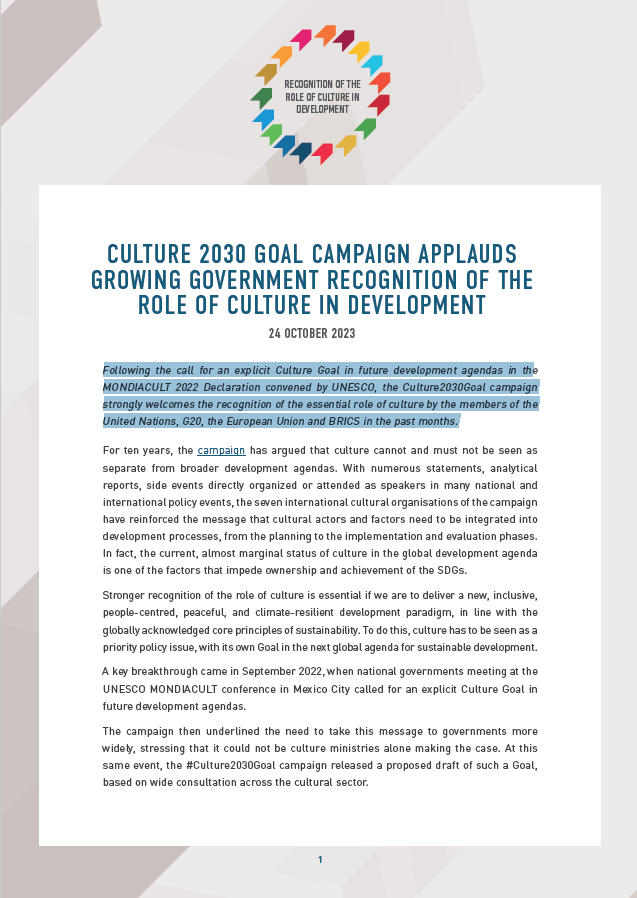
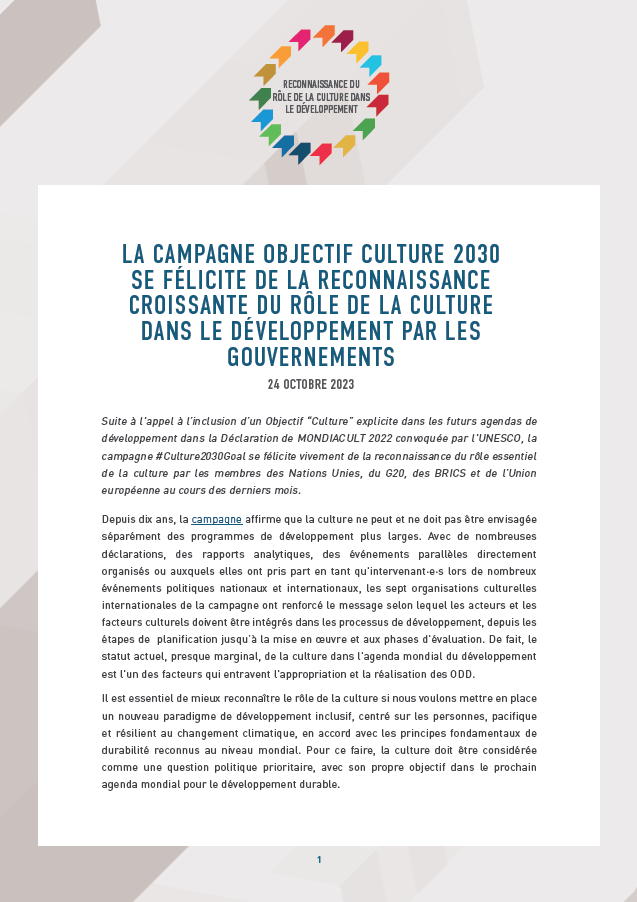
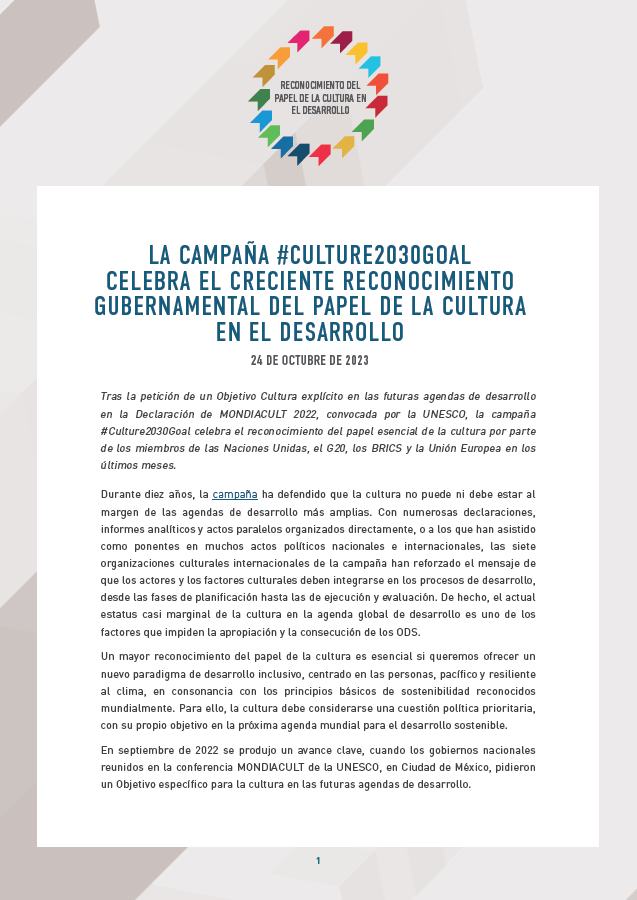
In 2023, the #Culture2030Goal Campaign released a piece on "Culture in the Voluntary National Reports: an Overview of the 2023 Reports" coordinated by IFLA and which highlights some of the different ways in which culture is addressed in these Reviews, celebrates good practices, and indicates areas for further focus.
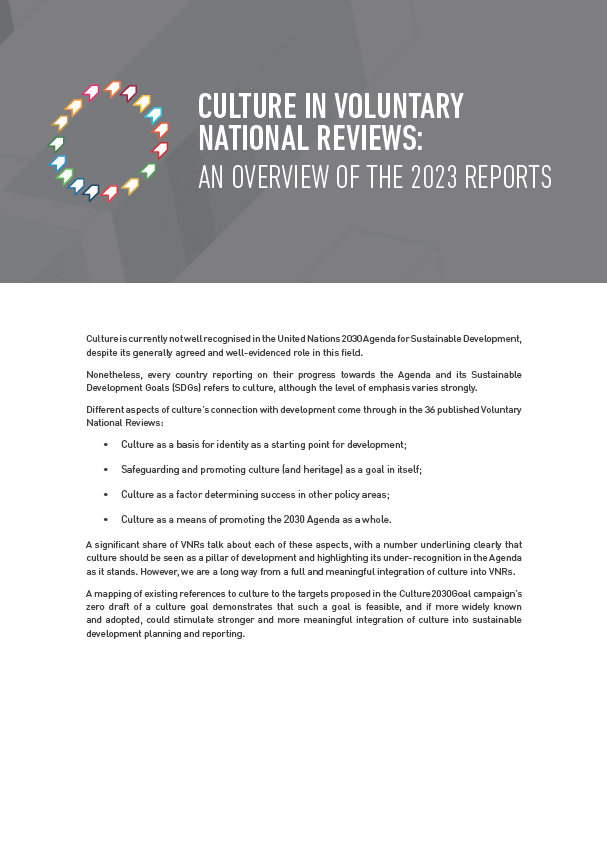
Towards the SDG Summit which will take place in New York in next September, the #Culture2030Goal campaign has launched a pledge to call the UN to include culture in the Zerodraft Declaration of the Summit.
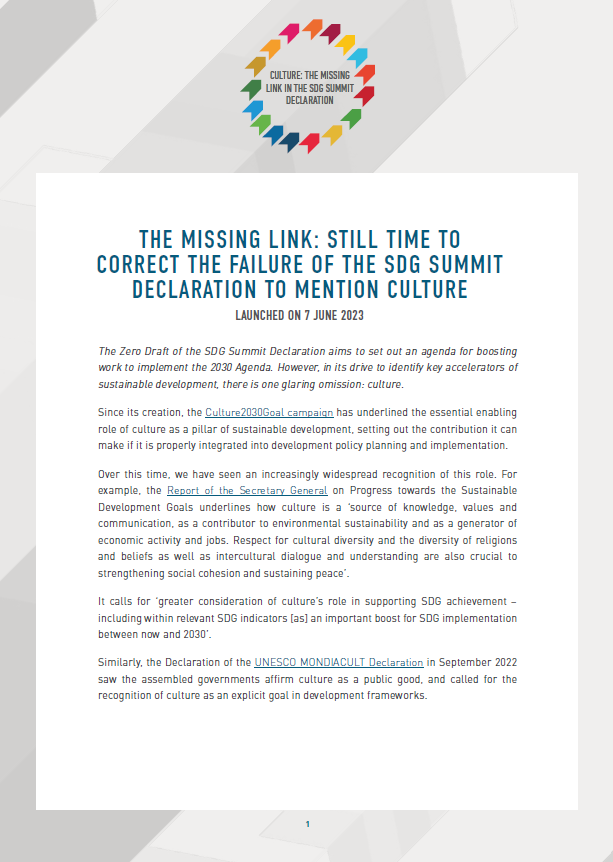
THE FAILURE OF THE SDG SUMMIT
DECLARATION TO MENTION CULTURE
The members of the #Culture2030Goal Campaign strongly welcome the undertaking in the Declaration of the MONDIACULT 2022 Conference to integrate a specific Culture Goal in the post-2030 development agenda. In this context, the campaign releases the new Statement: Commitment to an explicit culture goal in MONDIACULT Declaration welcome: now is the time to deliver.
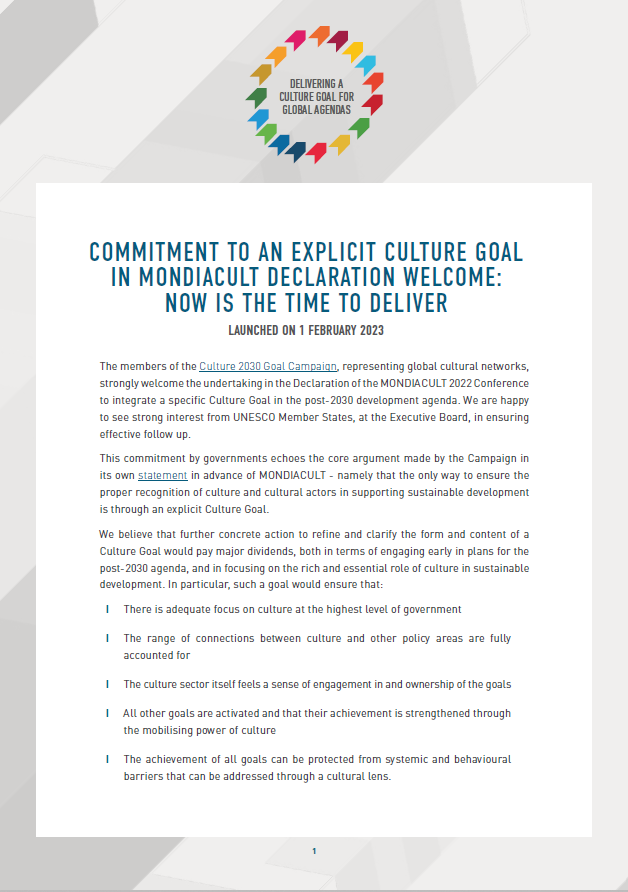
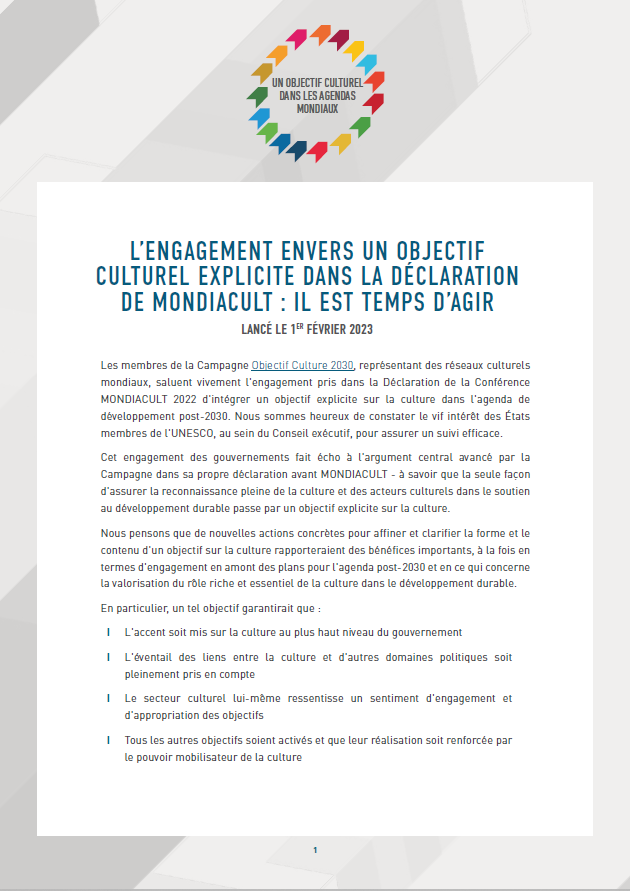
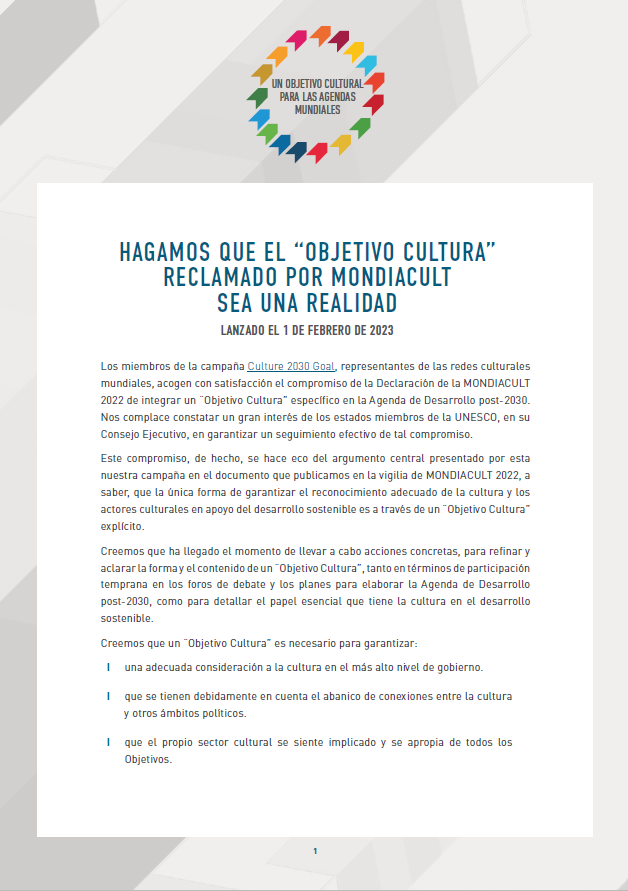
The #Culture2030Goal campaign, as major global cultural networks working together, has elaborated a Zerodraft of a future Culture Goal. Based on expert inputs and a survey of actors across the field, the draft Goal should allow for a new focus in efforts to ensure that culture takes its place at the heart of development planning.
In 2022, the #Culture2030Goal Campaign released a piece on "Culture in the Voluntary National Reports: an Overview of the 2022 Reports" which highlights some of the different ways in which culture is addressed in these Reviews, celebrates good practices, and indicates areas for further focus.
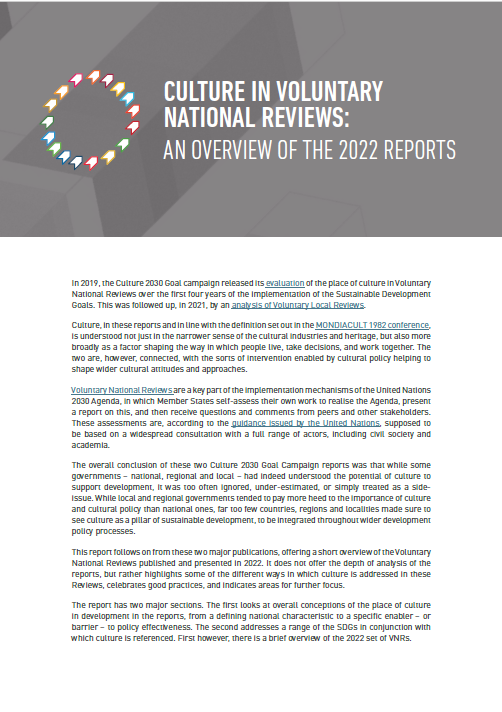
Forty years after UNESCO Global Conference on Cultural Policies in Mexico City and towards UNESCO Mondiacult 2022, to be held also in Mexico City in next September 2022, the members of the #culture2030goal campaign have released a Statement.
In the continuity of the 2019 report on “Culture in the implementation of the 2030 Agenda” which analysed the place of culture in the Voluntary National Reviews submitted to the UN High-Level Political Forum – HLPF, the #Culture2030goal campaign elaborated a new report on ‘Culture in the Localization of the SDGs: An Analysis of the Voluntary Local Reviews (VLRs)’.
The main findings of the analysis show that there is great diversity of how local and regional governments (LRGs) address culture in their sustainable development policies and reporting. A good majority of VLRs have included the cultural dimension in their implementation of the 2030 Agenda, through substantive narratives. Cultural topics can be found at any level, as part of high-level policy frameworks and as practical examples of implementation, as separate sectoral headings, where LRGs have dedicated ‘cultural plans’, or supporting aspects of other policy headings, diffused throughout different Goals and Targets.
On 20 April 2020, the partners of the #culture2030goal campaign released a Statement on Culture and the COVID-19 pandemic. Signed by eight international cultural networks, the statement is framed by our commitment to the 2030 Agenda and the need to guarantee culture is at the heart of the UN Decade of Action for the SDGs.
Entitled ‘Ensuring culture fulfills its potential in responding to the COVID-19 pandemic’, the statement’s preamble emphasizes:
“With the world faced with the COVID-19 pandemic today and the need to rebuild our societies tomorrow, culture should be at the heart of the response. Culture brings inspiration, comfort and hope into people’s lives. To harness this potential, the Culture 2030 Goal movement, in the context of its engagement in the United Nations 2030 Agenda, calls on UN agencies, governments and all other stakeholders to act.”
The statement is endorsed by the President of the United Nations General Assembly, His Excellency Mr Tijjani Muhammad-Bande. See the press release.
The official launch of the Statement took place on 21 May 2020, the World Day for Cultural Diversity for Dialogue and Development. The date illustrates the commitment of the campaign to the achievement of development goals, and in particular the 2030 Agenda. In this context, the organisations behind the Statement underline the need to ensure that culture is at the heart of the UN Decade of Action for the Sustainable Development Goals. Check out the concept note of the launch.
More info HERE.
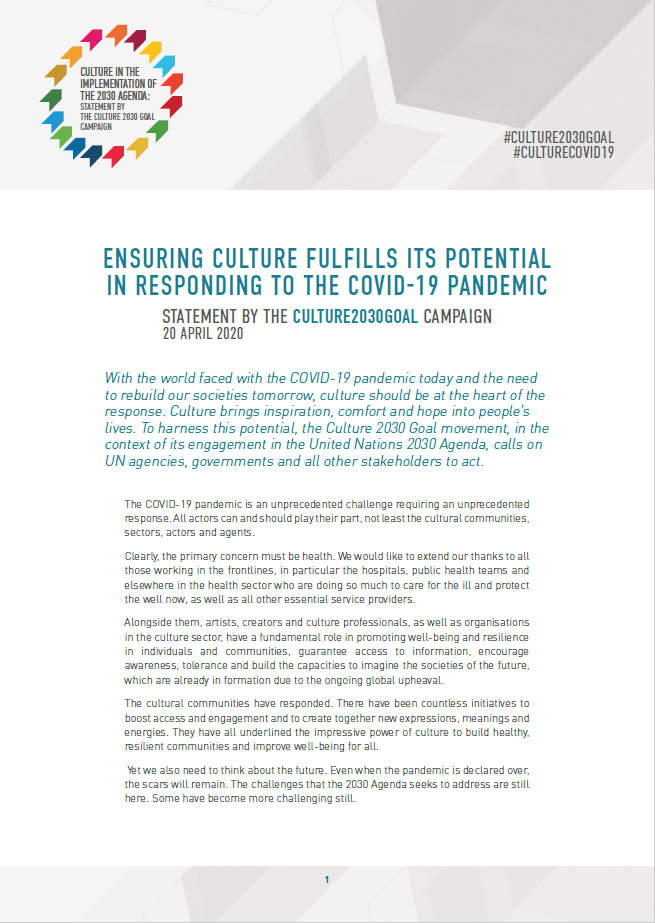
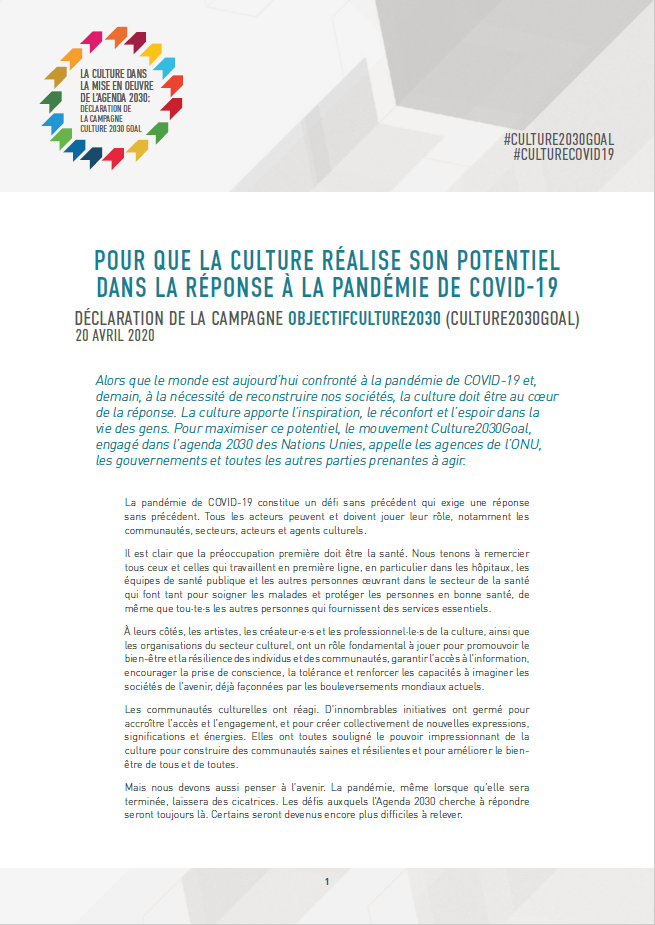
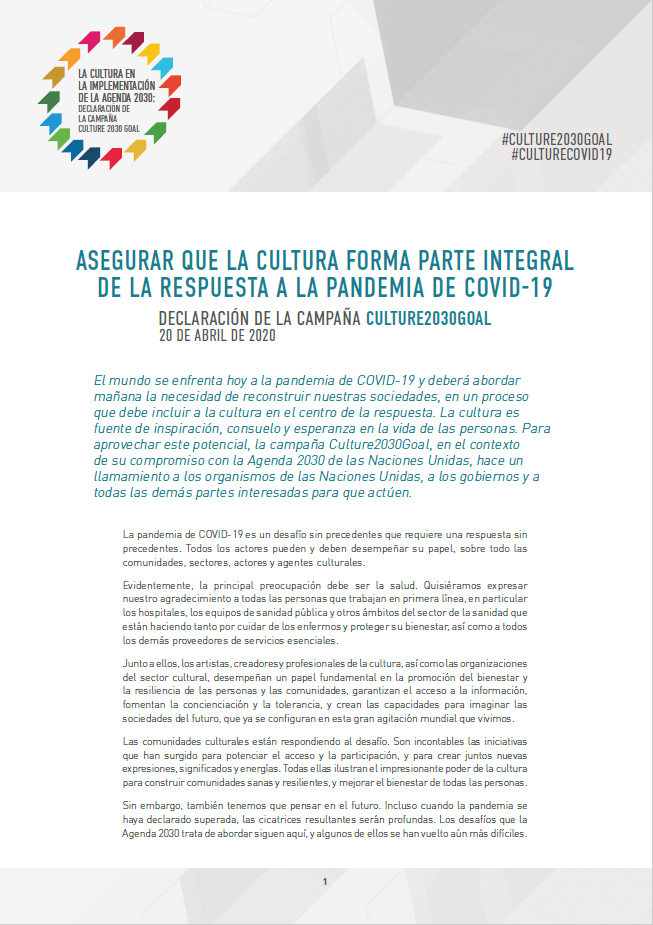
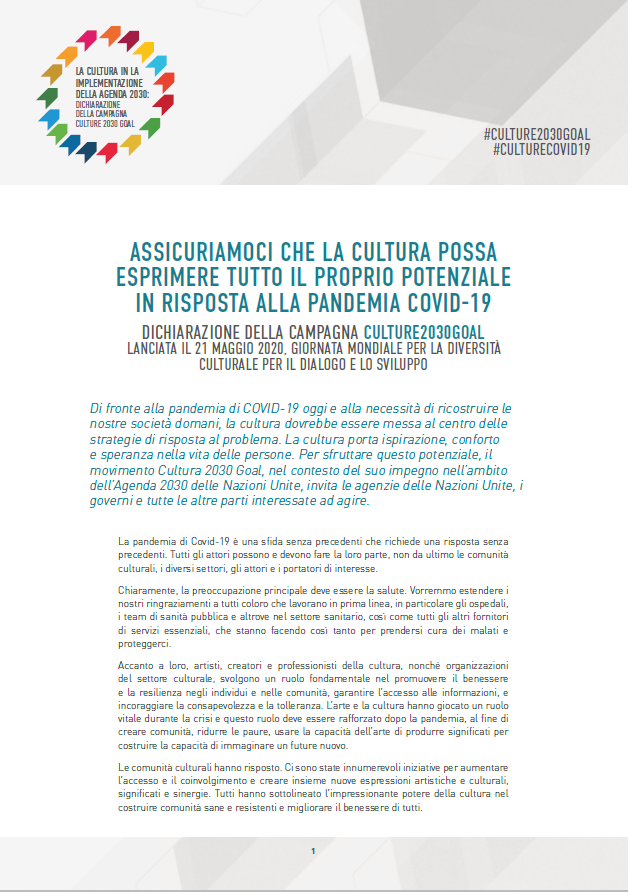
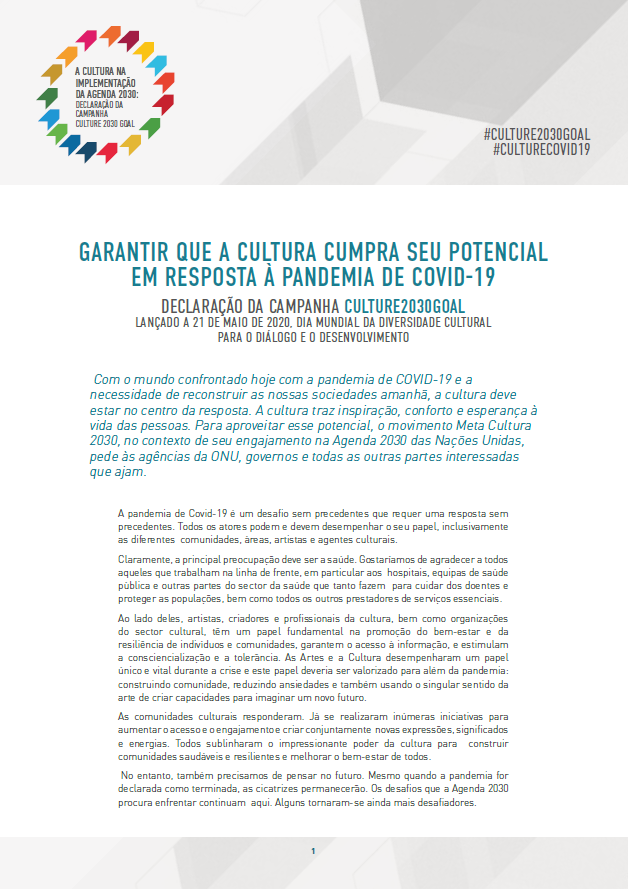
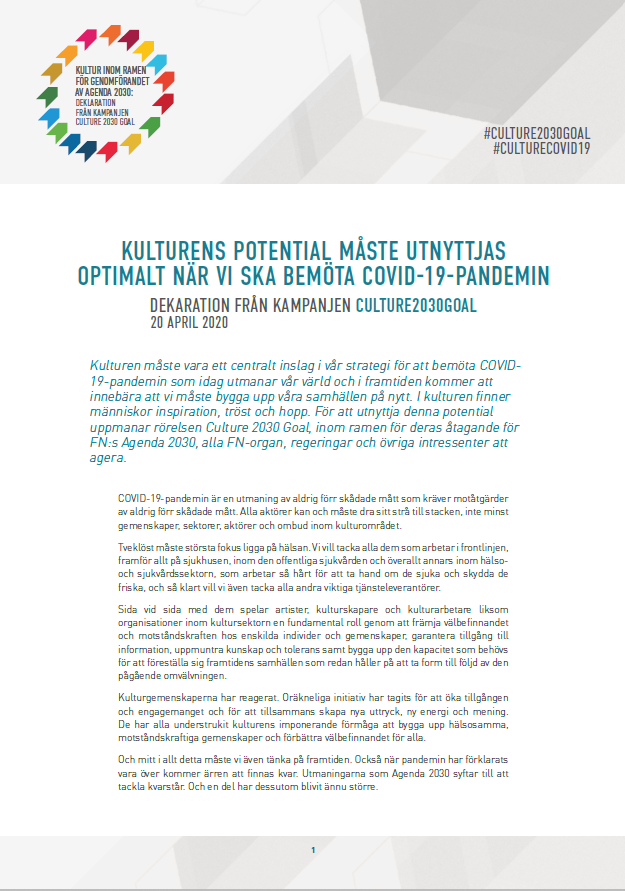
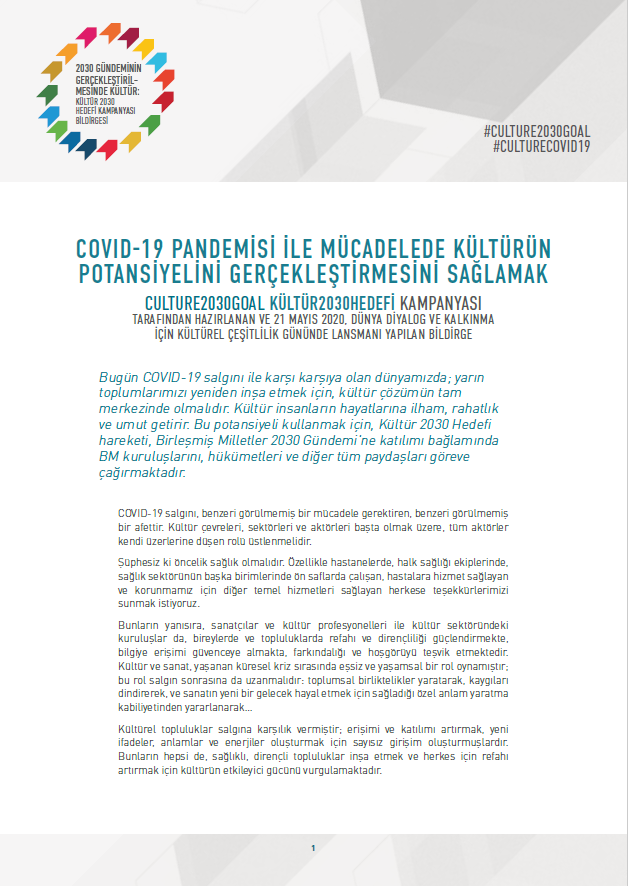
In September 2019, the campaign published the report “Culture in the implementation of the 2030 Agenda”. It analyzes the national reviews submitted to the High-Level Political Forum – HLPF (the main UN meeting that oversees the implementation of the Sustainable Development Goals – SDG). The report makes evident the (still marginal) presence of cultural factors and actors in the implementation of the SDG.
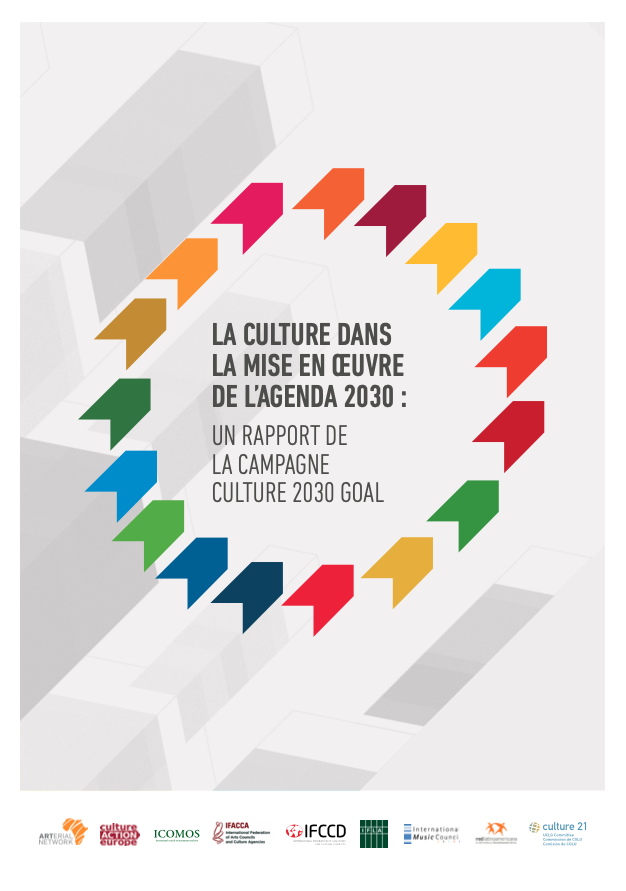
In the years leading to the adoption of the SDGs, several global networks campaigned, under the banner ‘The Future We Want Includes Culture’, for the inclusion of one specific goal devoted to culture, or for the integration of cultural aspects across the SDGs. This campaign was also known as the #culture2015goal campaign.
Four documents, including a #CultureGoal proposal, a declaration, a proposal of possible indicators for measuring the cultural aspects of the SDGs, and an assessment of the final 2030 Agenda were produced between 2013 and 2015. The declaration released in May 2014 was endorsed by 843 organisations and 2135 individuals.
